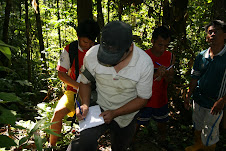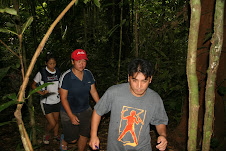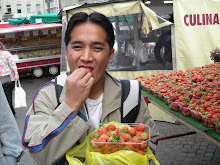
1. We, the Youth of Ulu Papar, in supporting and promoting the United Nations Declaration on the Rights of Indigenous Peoples, wish to convey this recent statement by the Permanent Mission of Malaysia to the United Nations:
“On 13 September 2007, Malaysia joined 143 other countries which voted in favour of General Assembly Resolution 61/295 to adopt the United Nations Declaration on the Rights of lndigenous Peoples (UNDRIP). The Declaration was significant in that the whole spectrum of individual and collective rights of indigenous peoples were recognised. The Declaration sets out the principles and standards to which all stakeholders should strive for”.
The recent statement by the Permanent Mission of Malaysia to the United Nations on the 19th of October 2009 during the 64th session of the United Nations General Assembly, reaffirms Malaysia’s commitment to the Declaration in fulfilling its international obligations to ensure protection of the rights and development of the indigenous populations.
2. We, the Youth of Ulu Papar, do not agree with the State government’s unsustainable development concept for the proposed Kaiduan Dam as part of KK water supply plan. There are many researches that have been done that prove the harmful and negative impacts of dams to the environment sustainability, social stability and health security. We are aware of all negative impacts that dam projects has brought to the state, the land and the peoples.
(Please refer to appendix 3 and appendix 4: Baram and Murum Dam fact sheets).
Impact of Bakun, Sarawak
Impact of Kelau, Selangor
Impact of Babagon, Sabah
3. We, the Youth of Ulu Papar, urge the government to conduct the Environmental Impact Assessment & the Social Impact Assessment that is required to be done prior to any consideration of any development plans that affects our indigenous territory. If the assessment is claimed to be done, we urge the relevant parties to clarify their credibility in this particular matter and another assessment should be done by an independent expert.
4. We, the Youth of Ulu Papar, wish to remind the government to fulfill its commitment to the UNDRIP Article 10 that states: Indigenous peoples shall not be forcibly removed from their lands or territories. No relocation shall take place without the free, prior and informed consent (FPIC) of the indigenous peoples concerned and after agreement on just and fair compensation and, where possible, with the option of return. We are disappointed that there wasn’t any prior consultation or even information regarding the proposed Kaiduan Dam to be built on our ancestral land. It is the duty of the government to include our participation, consultation and consent in any development plans that is to be carried out on Indigenous Peoples Territory.
5. We, the Youth of Ulu Papar, do not accept any form of compensation or deal that is not fair and equitable for the loss of our ancestral land, our social harmony, our fruit trees and paddy fields, our rivers and forests, our traditional livelihood and we will not budge from our position to defend our land, like our fathers before us did and his father before him.
6. We, the Youth of Ulu Papar, are skeptical towards the incompetence of government representatives that does not know the proper facts before presenting a statement in our local newspaper. We wish to correct the misinformation that peoples’ ‘houses and so on’ is the cause of the unfortunate Greg Storm tragedy. It is common knowledge and proven that the cause of that natural disaster was due to the excessive logging and the accelerated development plans such as mono-crop plantations and more deforestation that was carried out to make way for market economy. There is no need to offer us safety, the so-called concern addressed by the same representative, because we have protected and secured our territory and ourselves for generations.
7. We, the Youth of Ulu Papar, are voicing out our concerns to the government to ensure sustainable development plans and maintain our biocultural diversity, for the future of our homeland, the State of Sabah. As the future generation, we demand our rights to the accountability of proper governance over our land, territories and resources, as well as the peoples. We condemn all unsustainable development plans and unsustainable use of Sabah’s resources, which is now obvious to be seen, happening right before our very eyes. We refuse to accept that the exploitation of Sabah’s land, territories and resources as well as the peoples, will continue and it is our duty as the next generation to voice out our concerns and unite our actions.
8. We, the Youth of Ulu Papar, assert our rights as the next generation to live by a holistic and sustainable way of life and integrate that into our future development based on indigenous peoples’ development concept which includes cultural and environmental integrity, environment sustainability, economic and health sufficiency as well as communities’ empowerment and self-governance. We will demand and assert our Right to Life.
9. We, the Youth of Ulu Papar, are proud of our unity and unique identity. We are the descendants and custodians of the oldest living cultures in human history. We will enjoy our Right to Life, and at the same time we strive for peace, equality and dignity for all mankind. We are proud Malaysians and loyal Sabahans. And we are certain this same spirit lingers in all youths and children, men and women, elders, family and friends, all through out Sabah. Our land below the wind.
10. We, the Youth of Ulu Papar, applaud the efforts of our brothers and sisters in Kg.Terian for their effort to develop their village as ‘Kampung Mesra Alam’ and this effort should not go unrewarded. This smart and sustainable concept should be a model for all villages, to rise up to the government’s call for a ‘green’ lifestyle and its concern with the global environment crisis. Let us support their honourable intention.
11. We, the Youth of Ulu Papar, would like to thank our leaders and other government and non-governmental agencies that have been collaborating with our communities for years in building our capacity and sharing knowledge of biocultural diversity. We honour you and welcome you to our homes. Other appointed leaders should imitate this act of honour and show kindness in return for mutual respect from members of the community.
“On 13 September 2007, Malaysia joined 143 other countries which voted in favour of General Assembly Resolution 61/295 to adopt the United Nations Declaration on the Rights of lndigenous Peoples (UNDRIP). The Declaration was significant in that the whole spectrum of individual and collective rights of indigenous peoples were recognised. The Declaration sets out the principles and standards to which all stakeholders should strive for”.
The recent statement by the Permanent Mission of Malaysia to the United Nations on the 19th of October 2009 during the 64th session of the United Nations General Assembly, reaffirms Malaysia’s commitment to the Declaration in fulfilling its international obligations to ensure protection of the rights and development of the indigenous populations.
2. We, the Youth of Ulu Papar, do not agree with the State government’s unsustainable development concept for the proposed Kaiduan Dam as part of KK water supply plan. There are many researches that have been done that prove the harmful and negative impacts of dams to the environment sustainability, social stability and health security. We are aware of all negative impacts that dam projects has brought to the state, the land and the peoples.
(Please refer to appendix 3 and appendix 4: Baram and Murum Dam fact sheets).
Impact of Bakun, Sarawak
Impact of Kelau, Selangor
Impact of Babagon, Sabah
3. We, the Youth of Ulu Papar, urge the government to conduct the Environmental Impact Assessment & the Social Impact Assessment that is required to be done prior to any consideration of any development plans that affects our indigenous territory. If the assessment is claimed to be done, we urge the relevant parties to clarify their credibility in this particular matter and another assessment should be done by an independent expert.
4. We, the Youth of Ulu Papar, wish to remind the government to fulfill its commitment to the UNDRIP Article 10 that states: Indigenous peoples shall not be forcibly removed from their lands or territories. No relocation shall take place without the free, prior and informed consent (FPIC) of the indigenous peoples concerned and after agreement on just and fair compensation and, where possible, with the option of return. We are disappointed that there wasn’t any prior consultation or even information regarding the proposed Kaiduan Dam to be built on our ancestral land. It is the duty of the government to include our participation, consultation and consent in any development plans that is to be carried out on Indigenous Peoples Territory.
5. We, the Youth of Ulu Papar, do not accept any form of compensation or deal that is not fair and equitable for the loss of our ancestral land, our social harmony, our fruit trees and paddy fields, our rivers and forests, our traditional livelihood and we will not budge from our position to defend our land, like our fathers before us did and his father before him.
6. We, the Youth of Ulu Papar, are skeptical towards the incompetence of government representatives that does not know the proper facts before presenting a statement in our local newspaper. We wish to correct the misinformation that peoples’ ‘houses and so on’ is the cause of the unfortunate Greg Storm tragedy. It is common knowledge and proven that the cause of that natural disaster was due to the excessive logging and the accelerated development plans such as mono-crop plantations and more deforestation that was carried out to make way for market economy. There is no need to offer us safety, the so-called concern addressed by the same representative, because we have protected and secured our territory and ourselves for generations.
7. We, the Youth of Ulu Papar, are voicing out our concerns to the government to ensure sustainable development plans and maintain our biocultural diversity, for the future of our homeland, the State of Sabah. As the future generation, we demand our rights to the accountability of proper governance over our land, territories and resources, as well as the peoples. We condemn all unsustainable development plans and unsustainable use of Sabah’s resources, which is now obvious to be seen, happening right before our very eyes. We refuse to accept that the exploitation of Sabah’s land, territories and resources as well as the peoples, will continue and it is our duty as the next generation to voice out our concerns and unite our actions.
8. We, the Youth of Ulu Papar, assert our rights as the next generation to live by a holistic and sustainable way of life and integrate that into our future development based on indigenous peoples’ development concept which includes cultural and environmental integrity, environment sustainability, economic and health sufficiency as well as communities’ empowerment and self-governance. We will demand and assert our Right to Life.
9. We, the Youth of Ulu Papar, are proud of our unity and unique identity. We are the descendants and custodians of the oldest living cultures in human history. We will enjoy our Right to Life, and at the same time we strive for peace, equality and dignity for all mankind. We are proud Malaysians and loyal Sabahans. And we are certain this same spirit lingers in all youths and children, men and women, elders, family and friends, all through out Sabah. Our land below the wind.
10. We, the Youth of Ulu Papar, applaud the efforts of our brothers and sisters in Kg.Terian for their effort to develop their village as ‘Kampung Mesra Alam’ and this effort should not go unrewarded. This smart and sustainable concept should be a model for all villages, to rise up to the government’s call for a ‘green’ lifestyle and its concern with the global environment crisis. Let us support their honourable intention.
11. We, the Youth of Ulu Papar, would like to thank our leaders and other government and non-governmental agencies that have been collaborating with our communities for years in building our capacity and sharing knowledge of biocultural diversity. We honour you and welcome you to our homes. Other appointed leaders should imitate this act of honour and show kindness in return for mutual respect from members of the community.



